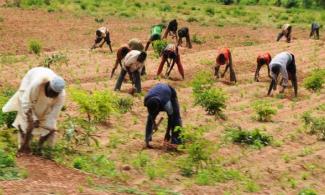
Out of the 11 main rice producing states in the country, Benue, Borno, Ebonyi and Kaduna have witnessed attacks on farmers
Nigeria is currently facing a near famine as food inflation rises to a record 21.79 per cent which is the highest since 2015, a report by SB Morgen Intelligence has stated.
The African-focused research firm, in its April 2021 report, which focused on rising food prices being fuelled by insecurity and inadequate response, stated that food production in Nigeria has been affected over the last 10 years by “continuous conflicts between herders and farmers in the Middle Belt, terrorist attacks on farmers in the North-East and bandit attacks in the North-West.”

The SBM Intel report revealed that agricultural activities have reduced nationwide as many flee the farms for safety, adding that more than 62,000 farmers in the Middle Belt were displaced from their homeland between 2010 and 2015.
The report said, “Overlapping with these gruesome conflicts are adverse weather conditions of flood and droughts and decreasing agricultural land due to urbanisation. For instance, in Kaduna State between 1980-2012, agricultural land declined from 24,282.93 hectares (59% of the total land area) to 17,865.5 hectares or 43.4% of total land area). The effects of the coronavirus pandemic, issues of governance failures/resulting unrest, policy failures (border closure policy – a combination of both internal and external factors.
“These factors have driven up food prices, leading up to a food inflation rate of 21.79% in February 2021, the highest the country has recorded since 2015 and headline inflation of 17.33%, marking the 18th consecutive month of rising inflation in a country where 56.5% of their income is spent on food.
“In the review period of this report, from October, 2020 to March 2021, the effect of these events has lingered, despite Nigeria’s re-opening of its land borders in December of last year. Reduced local production, exchange rate fluctuations, poor harvest due to adverse weather conditions, high cost of energy (electricity/ transport) tariffs are some of the reasons why food prices have remained high.
“Some of the Jollof rice ingredients rice, onions, tomatoes, have witnessed reduced local production because of protracted conflicts and terrorist attacks on farmers. Out of the 11 main rice producing states in the country, Benue, Borno, Ebonyi and Kaduna have witnessed attacks on farmers with the most gruesome being the execution of about 110 rice farmers in Borno in November 2020. As a result of these incidents, several farmers are leaving the countryside and moving to the cities to take up menial jobs.”